Three victories, five draws and Grischuk’s second defeat in a row have marked the second day of the FIDE Grand Prix Belgrade, organized by World Chess
Anish Giri and Vidit Gujrathi have scored again, and they are the only two players with two victories.
The second round started at 3 PM local time, with Aleksandar Vulin – Serbia’s minister of interior affairs – making the first move in the game between Maxime Vachier-Lagrave and Shakhriyar Mamedyarov.
Pool A
The game between Etienne Bacrot and Dmitry Andreikin ended in a draw. In the Ruy Lopez, White managed to gain a slight edge in the opening, putting pressure on Black’s position. After a few imprecise moves, however – particularly 19.Rc1 – Black got some breathing space and engineered a counter-attack on the kingside.
Bacrot found a nice move 24.Bg5, securing that any further simplifications help relieve him of the pressure on the board. The game transpired into an endgame where Black was better; however, Bacrot managed to pose some problems, which Andreikin did not manage to find the correct answer for. Probably Black had to venture upon g6-g5 at some point because after the Frenchman pushed h2-h4 and f2-f4, he got out of danger.
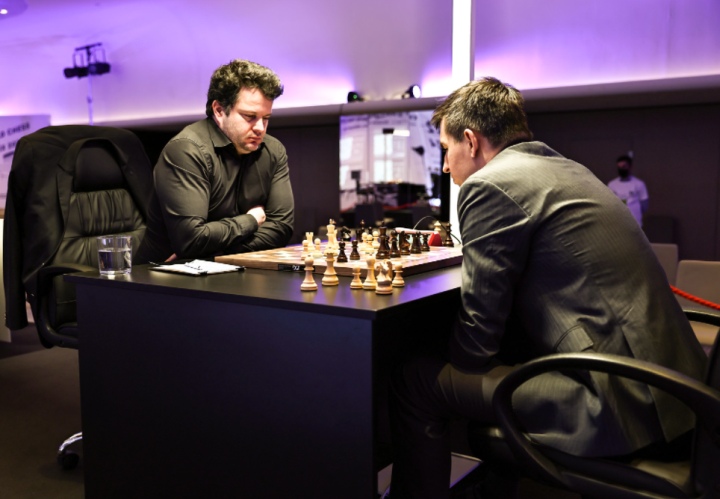
After losing in the first round, Alexander Grischuk suffered another defeat, this time at the hands of Sam Shankland. Although Grischuk was standing better on the black side of Nimzo-Indian by move 17, he allowed White to come back into the game after a suspicious 19…Nc5, sacrificing a pawn. Alexander had sufficient compensation but erred with 22…Rc6 – the game liquidated into a hopeless ending for Black despite equal material. With no better options, Grischuk resigned on the move 39.
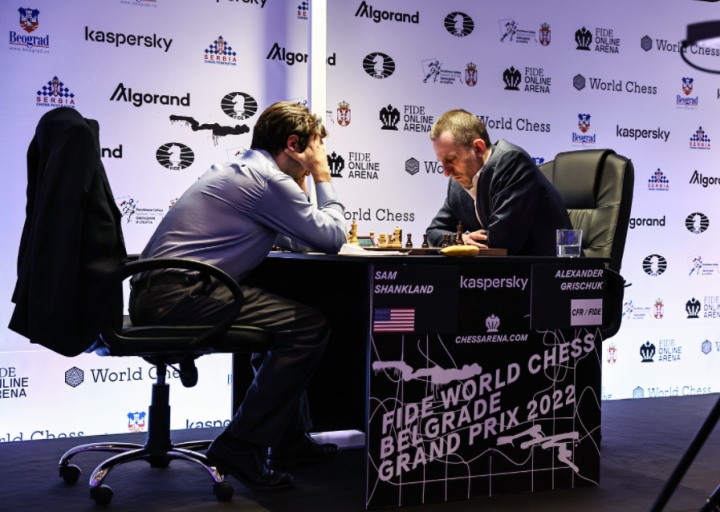
Grischuk is now the only player in the tournament without any points.
Pool B
Anish Giri won a second game in a row. He was better against Nikita Vitiugov, who had an easy pass in the first round following Pentala Harikrishna’s early blunder on Tuesday.
The game started calmly, as Giuoco Pianissimo suggests, with both sides developing and trying to gain control of the centre. However, Anish met 14…f6? with a powerful breakthrough in the center and grabbed the initiative. Giri did not find the best way to build up pressure, and by move 20, the game was even.

It did not prevent Giri from setting off some fireworks as he sacrificed his dark-squared bishop to launch an attack on the kingside. Vitiugov accepted the gift and defended with precision until move 30, when he committed a fatal error 30…c7-c5. Giri leapt at the chance, and two moves down the road, Nikita threw in the towel.
With this victory, Giri is on two out of two and shows that he is in excellent form.
The second pair of Pool B, Amin M. Tabatabaei and Pentala Harikrishna, made a draw in the Caro Kann. It was a lucky escape for the Iranian, who spent a lot of time in the opening and then made a blunder with 21.c4, handing over an almost decisive advantage to Black. By move 26, Black was completely dominating the board. However, instead of bringing his knight into play and going for the white king, Pentala opted to collect two pawns on the kingside, giving White time to organise a defence and “trap” Black’s queen perpetually attacking the most powerful piece.

Following the game, Tabatabaei said that he is spending too much time thinking about the moves and that time management is a problem for him in this tournament.
Conversely, Harikrishna said he was too hasty in his play, allowing White the repetition and even more chances to play for an advantage.
Pool C
Vidit Santosh Gujrathi scored a well-deserved victory over Vladimir Fedoseev in the Nimzo Indian. It was the longest game of the second round, lasting around four and a half hours. Vidit played the same line that Rapport tested against Feseev yesterday and also got some edge. White gradually restricted Black’s pieces and timely opened the centre on the move 23 to give some work for his bishop pair. Despite some time trouble the Indian was building up pressure, taking control over the proceedings.
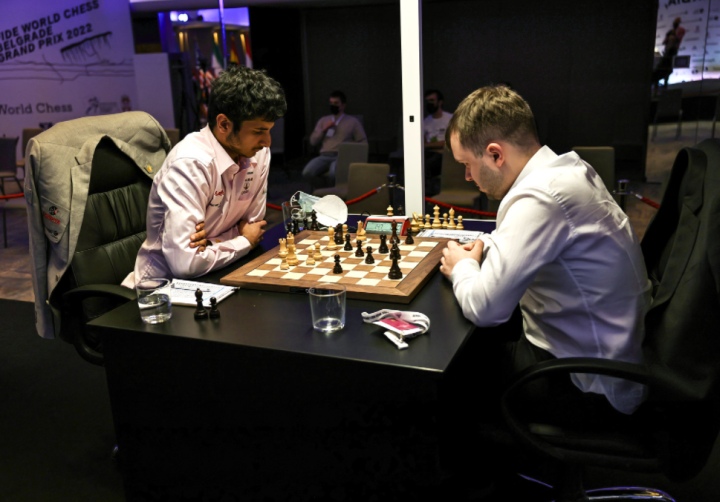
Fedoseev gave up an exchange hoping for his c-passer and active knights, but Vidit penetrated with his rooks into Black’s camp along the h-file, and that made all the difference. Fedoseev resisted, but his efforts were not enough to repel White’s advances, and he had to call it a day.
“I feel very good that I managed to win these games. In the last couple of tournaments, I managed to bodge similar positions. So I’m relieved I won,” said Gujrathi after the game.
The game between Alexei Shirov and Richard Rapport was the first one to finish, after just over an hour of play. Rapport surprised Shirov with the Petrov and then with 4…Nc6. “I used to have some games in this line more than 20 years ago”, Shirov recalled after the game. He spent quite some time thinking about the next move. Alexei could have opted for much sharper lines, but the seasoned GM probably concluded that he didn’t feel confident going down that path. Instead, Shirov took a safe line leading to simplifications. After exchanges in the centre, the game transpired into an opposite colour bishops endgame and the two Grandmasters agreed on a draw after the 30th move.
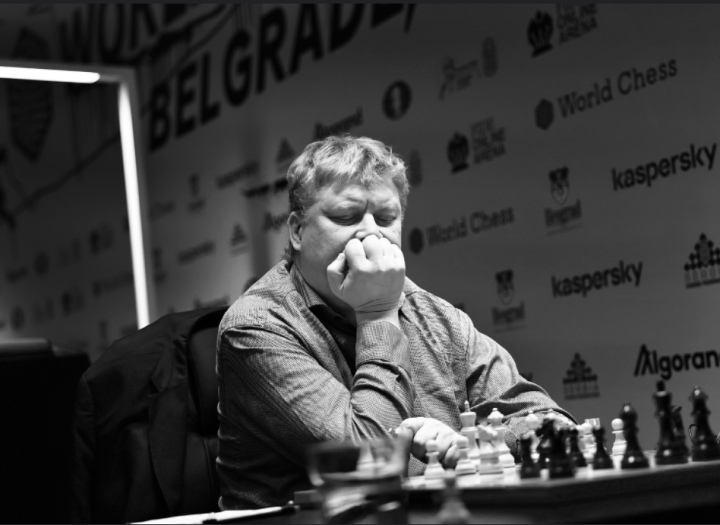
In the post-game interview Alexei Shirov reflected on the time spent in Belgrade and the tournaments he played in the capital of former Yugoslavia during the 1990s. “It was quite a thing to play in Belgrade back then… What stood out was a big audience at the event and huge interest for chess which was rather unusual”, noted the seasoned GM.
Pool D
One of the most exciting games of the day took place on the board where Maxime Vacheir-Lagrave was leading the white pieces against Shakhriyar Mamedyarov. The Open Variation of Ruy Lopez was played, and an interesting position emerged after White’s 11th move Qe1, one that was tested in the game Vachier-Lagrave – Giri back in 2019 in Zagreb. There were several lines for Black to choose. Instead of continuing as Giri with 11…Nc5, Mamedyarov opted to castle and prepare to mount pressure on the kingside flank. After exchanging blows in a very sharp line Mamedyarov emerged a piece down but had a pin on White’s pieces and a couple of pawns as compensation. However, as he noted in the post-game interview, it was “a very risky position” for Black – “without the attack, Black can resign”.

On the other hand, White had to be careful and play very precisely. After Maxime missed a chance to grab the initiative by sacrificing an exchange on move 22 (Bxc5) and played a timid 21.Rfe1, he found himself in a tough position. Apparently, MVL missed Black’s move 21…g5 after which it was not easy for White to play. Two moves down and after 23.Nh4, which MVL played in haste, Black was clearly better, with two extra pawns.
However, as it was mentioned in the post-game analysis, both players missed 24…Ra7 – which just protects the seventh rank and secures Black’s position. “For the human IQ, this is too much”, said Mamedyarov. Instead, he played 24…d2, allowing White to force a draw. In the final position – despite being two exchanges up, Black’s king was too exposed to checks and the two agreed on a draw.
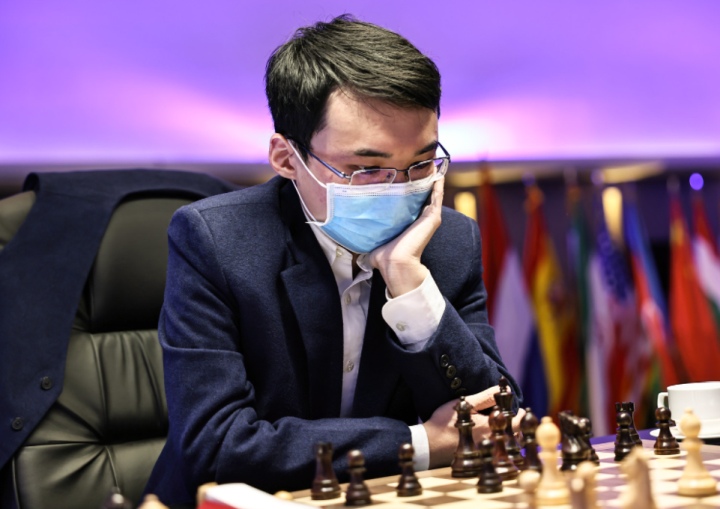
Alexandr Predke and Yu Yangyi drew their game. In the Petrov, Yu Yangyi equalised early on after Predke – in his own words – “chose the wrong way” in the opening, suggesting that he should have played 13.Nc3 instead of 13.Nd2. Yu Yangyi was more precise and, after equalising, managed to create a slightly more promising position, but it was always very close. The opponents castled to the opposite wings, presumably suggesting mutual attacks, but after massive exchanges in the centre, they moved to a drawn rook endgame and spilt point.
Round 3
The Fide Grand Prix continues on Thursday, 3rd March, with the third round starting at 3 PM local (CET) time.
The pairings for the third round are as follows:
Pool A:
Dmitry Andreikin (2724) vs Sam Shankland (2704)
Alexander Grischuk (2758) vs Etienne Bacrot (2635)
Pool B:
Nikita Vitiugov (2726) vs Amin M. Tabatabaei (2623)
Pentala Harikrishna (2716) vs Anish Giri (2771)
Pool C:
Vladimir Fedoseev (2704) vs Alexei Shirov (2691)
Richard Rapport (2762) vs Vidit Santosh Gujrathi (2723)
Pool D:
Shakhriyar Mamedyarov (2776) vs Alexandr Predke (2682)
Yu Yangyi (2713) vs Maxime Vachier-Lagrave (2761)
The FIDE Grand Prix Series is brought to you by World Chess.
Leading partners supporting the FIDE Grand Prix Series 2022 include:
Kaspersky as the Official Cybersecurity Partner;
Algorand as the Official Blockchain Partner;
Prytek as the Technology Transfer Partner;
FIDE Online Arena as the official Partner.
Text: Milan Dinic
Photo: Mark Livshitz
Official Photo FIDE Grand Prix Belgrade Press kit
About World Chess:
World Chess is a London-based chess gaming and entertainment group and FIDE’s official broadcaster and commercial partner. World Chess organised the FIDE Championship Matches in Russia, the USA, and the UK, and revolutionised the sport by signing the biggest media partnerships in history. World Chess develops Armageddon, the chess league for prime-time television. World Chess also runs FIDE Online Arena, the exclusive official chess gaming platform. More at worldchess.com.
About FIDE:
The International Chess Federation (FIDE) is the governing body of the sport of chess, and it regulates all international chess competitions. Constituted as a non-governmental institution, it was recognised by the International Olympic Committee as a Global Sporting Organization in 1999.
FIDE currently has its headquarters in Lausanne, but it was initially founded in 1924 in Paris under the motto “Gens una Sumus” (Latin for “We are one Family”). It was one of the very first International Sports Federations, alongside the governing bodies of the sports of Football, Cricket, Swimming, and Auto Racing. It is now one of the largest, encompassing 195 countries as affiliate members, in the form of National Chess Federations. Chess is nowadays a truly global sport, with dozens of millions of players in all the continents, and more than 60 million games on average played every day.
More information: www.fide.com
About Kaspersky
Kaspersky is a global cybersecurity and digital privacy company founded in 1997. Kaspersky’s deep threat intelligence and security expertise is constantly transforming into innovative security solutions and services to protect businesses, critical infrastructure, governments and consumers around the globe. The company’s comprehensive security portfolio includes leading endpoint protection and a number of specialised security solutions and services to fight sophisticated and evolving digital threats. Over 400 million users are protected by Kaspersky technologies and we help 240,000 corporate clients protect what matters most to them. Learn more at www.kaspersky.com.
About Algorand
Algorand is building the technology to power the Future of Finance (FutureFi), the convergence of traditional and decentralised models into a unified system that is inclusive, frictionless, and secure. Founded by Turing Award-winning cryptographerSilvio Micali, Algorand developed a blockchain infrastructure that offers the interoperability and capacity to handle the volume of transactions needed for defi, financial institutions and governments to smoothly transition into FutureFi. The technology of choice for more than 700 global organisations, Algorand is enabling the simple creation of next generation financial products, protocols and exchange of value. For more information, visit www.algorand.com.
About Prytek
The Prytek Group combines technology companies and services companies to create a new asset class. We build legacy service businesses and combine them with deep tech technologies to increase margins. We buy out entire operations and create efficiency and scalability through our technologies. The group is divided into a Corporate Arm – which comprises of controlled companies and an Investment Arm – which acts as a VC and PE fund of the Group. The goal of the Corporate Arm is to generate consolidated cash with a legacy vision, while the Investment Arm is to develop products for our operations and generate profit via equity value growth and exit at a high valuation.
Prytek Building Technologies, Delivering Managed Services. Prytek: www.prytek.com
About FIDE Online Arena
FIDE Online Arena is the exclusive online chess gaming platform that awards online ratings recognised by FIDE. It hosts rated tournaments and games 24 hours per day. The platform runs an advanced fairplay engine. Play official games at chessarena.com.







